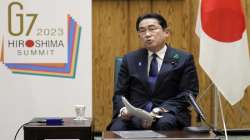Days after pipe bomb attack, Japan PM Fumio Kishida vows security review before G-7 summit in Hiroshima
Addressing a select group of media from G-7 countries, Japanese Prime Minister Fumio Kishida underscored that the use of violence to shut down free speech should never be tolerated irrespective of the reason.

Tokyo: Days after the pipe bomb attack at a campaign event, Japanese Prime Minister Fumio Kishida condemned the incident and vowed to review security procedures to ensure the safety of dignitaries visiting the country for the Group of Seven (G-7) summit in May.
Addressing the selected media from G-7 countries, he underscored that the use of violence to shut down free speech should never be tolerated irrespective of the reason. "The election, which is the foundation of democracy, should not succumb to violence. We must carry out the election until the end,” he said, explaining why he has continued to deliver speeches since the attack on April 15.
Pipe bomb hurled at Kishida
A man hurled a pipe bomb at Kishida at the fishing port of Saikazaki in the western prefecture of Wakayana just before he was to make a campaign speech for a local candidate from his governing party.
The moment the explosive fell near him, he was pushed away by special police and evacuated unhurt before the bomb exploded. The alleged attacker, Ryuji Kimura, 24, was wrestled to the ground and arrested on the spot.
The attack, which targeted the prime minister less than a year after former leader Shinzo Abe's assassination, raised questions about whether any lessons had been learned from Abe's case, especially as Japan navigates key events like the ongoing elections and G-7 meetings.
“As we prepare to welcome many guests from around the world for the G-7 summit and other events, I feel it is very important to once again review our security measures so that our guests can visit Japan with a sense of safety,” Kishida said.
ALSO READ: Japan PM Fumio Kishida's first reaction after blast during his speech in Wakayama I DETAILS
Kishida intends to appeal for nuclear disarmament
During the May 19-21 summit in his electoral constituency of Hiroshima — the target of the world's first atomic attack — Kishida plans to appeal for nuclear disarmament while pledging support for the rules-based international order and vowing to play a greater role as the only Asian member of the G-7 to bridge Western economies with the so-called Global South nations. He will also demand that Russia stop the war on Ukraine immediately.
The Japanese Prime Minister further said Russia's war on Ukraine has raised fears the same could happen in Asia, and he said calls for a rules-based international order, along with the rejection of a one-sided change to the status quo, could be widely accepted.
“It is extremely important for the G-7 to reaffirm the basic position, and it could help the international community to unite in case a situation like this happens in places other than Russia and Europe,” he added.
Strict gun control laws in Japan
It is worth mentioning here that violent crimes are rare in Japan. With its strict gun control laws, the country has only a handful of gun-related crimes annually, most of them gang-related.
But in recent years Japanese police have worried about “lone offender” attacks with homemade guns and explosives. Former Prime Minister Shinzo Abe was assassinated with a homemade gun at a campaign event on July 8 last year, just two days before the upper house election.
(With inputs from AP)